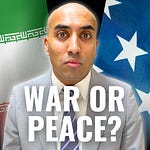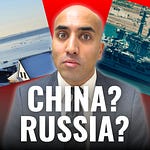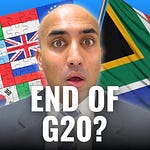When Americans tune into the presidential debate, they won’t just be listening to what Donald Trump (R) or Kamala Harris (D) have to say about jobs or healthcare. For many Americans, the candidate’s ideas about China or the Gaza War are just as important.
Unlike in the past, when world affairs seemed far from America, today world affairs is disrupting America.
American universities are being taken over by protests and encampments in support of Palestine; American society is grappling with TikTok, which has over 170 million domestic users, being treated as a Chinese trojan horse; the American homeland is under renewed threat after a man was arrested for planning “the largest attack on US soil since 9/11.”
World affairs is no longer something Americans read about in the news. It is something Americans are seeing with their own eyes.
Geopolitics has arrived in America.
And this is weighing on a portion of the American electorate.
In this historic election, and especially at the debate, many Americans will be paying close attention to how Trump and Harris plan to solve global crises that have besieged America and put the American way of life on the line.
The candidates may also subtly speak to some voters, whose party alignment is more fluid and who are unhappy with certain US moves, like sending aid to Ukraine while American cities face funding gaps.
Geopolitics could play a central role in the debate, shaping the conversation and the calculations candidates make about what to say - and when.
During the 90-minute debate, moderators will seek to extract policies; the candidates will try to use “foreign policy” or “hardball with other countries” as their moment to shine; and voters watch a debate where the lines separating America and the world increasingly blur.
GEOPOLITICS EVERYWHERE
The most important issues could see the candidates circling back to geopolitics.
There are two reasons for this. First, the path to solving various domestic challenges, from infrastructure to inflation, passes through the world stage. Second, a big focus of Harris will be to target Trump for mismanaging the country (including new ideas). The corresponding exit for Trump could be to target Harris (and the Democrats) for mismanaging the world (including immigration).
The issue of inflation and cost of living is weighing heavily on American voters. For Harris, solving inflation revolves around going after “bad actors” who are hiking up prices. This makes it purely a domestic challenge for the Harris camp. But, for Trump, solving inflation requires lowering energy prices. And, there are only two ways to do this: boost American energy production and involve countries like Saudi Arabia, Venezuela, even Russia. In Trump’s mind, inflation is partly linked to what Riyadh and Moscow are doing with energy production.
This means that Trump’s prescription to lower the cost of bacon or the cost of a car will revolve less around slashing interest rates or going after big business, and more about America’s energy security.
A conversation about prices could end in Moscow.
The issue of jobs and the economy will play a central role, especially as the new jobs report missed targets, as the economy added 118,000 jobs compared to predictions of almost 140,000. To grow the economy, both candidates are likely to bring up other nations, in particular China. To prove her experience in creating jobs and stimulating the economy, Harris could bring up the CHIPS Act or Inflation Reduction Act (IRA), legislation built with China in mind. This would reflect the kind of solutions a Harris presidency would unveil to grow the economy.
But, for Trump, growing the economy is increasingly about trade. And in Trump’s mind, the country “ripping off” America the most is China. This is why Trump has proposed a 60% flat tax on all Chinese imports. Add to this, other proposals, like a 10% tax on all other imports or a 100% tax on Chinese EVs imported from Mexico, and a big part of Trump’s economic strategy hinges on trade with the rest of the world.
And for both candidates, equally important is protecting American workers. Harris is likely to circle back to key legislation, while Trump could talk about cheap Chinese goods threatening autoworkers in Michigan or farmers in Wisconsin.
A conversation about jobs could end in Beijing.
The issue of political polarization and social unrest might trigger both candidates, resulting in a blame game. But, in part of this conversation, the topic of the Gaza War will inevitably be raised, as pro-Palestinian protests have become a semi-permanent feature of American society. And, it is becoming a headache for Harris and Trump donors as large US firms feel the heat of boycotts as the war rages and consumers in the US and abroad shop elsewhere.
This integrates two different areas: social tensions and foreign policy.
To end the protests, America has to somehow end the Israel-Hamas War. Could Trump or Harris propose new ideas for Israel at the debate? Alternatively, the candidates, in particular Harris, may attempt to empathize with supporters of Palestine, in a bid to connect with voters who share those concerns.
A conversation about social unrest could end in Tel Aviv.
At every critical juncture of the debate, the candidates could pull in the world stage.
While the distinction is clear, that Harris will focus more on domestic policy, while Trump will focus more on global policy, even the Harris domestic agenda or track record has geopolitics “embedded” in it, like the CHIPS Act, designed to build American chip sovereignty in the face of China’s technological threat, including an invasion of Taiwan.
Whatever topic the debate moves to, geopolitics could be constantly invoked.
HOT POTATOES
For Trump and Harris, bringing geopolitics into the picture is not about deflecting. It is about accepting. To solve the main problems America faces, the US has to include allies and adversaries alike, as Washington can not solve these challenges in isolation.
Beyond China or the Hamas War, there are two other “hot potatoes” that are likely to get raised during the 90 minutes.
The first is new terrorism.
While terrorism has receded from the American public spotlight, it is beginning to appear again. At the beginning of September, a Pakistani national was arrested in Canada for planning what he described as “the largest attack on US soil since 9/11.” The man, connected to ISIS, was preparing to attack Jewish communities in New York around October 7th. Before this, in March, ISIS-K, an affiliate of ISIS in Afghanistan and Pakistan, murdered over 130 at the Crocus City Hall in Moscow, the worst terrorist attack in Russia since 2004. And, between these two events, it was revealed that Iran was backing a plot to try and take out Trump. There is little room for confusion: a new resurgence in terrorism is underway. Protecting the American homeland is becoming important in a strangely familiar but new way.
The second is foreign interference.
Revelations that Moscow used shell companies and funded an American right-wing media upstart signals that foreign interference is as ripe as it has ever been. And, not just in the US. The recent elections in Germany, where AfD, the extreme-right party won big, also saw one AfD official being arrested for allegedly spying for China, while another one is under investigation for accepting payments from Russia. And this goes beyond just Russia or China. In fact, in America, one of the most active countries interfering in the election is Iran, which hacked the Trump campaign and released a dossier on JD Vance at the same time that Biden had announced he would not be seeking reelection. The kind of steps America’s adversaries are taking go beyond Facebook Ads, like during the 2016 election. Countries like China, Russia, and Iran have stepped foot into America itself.
These two hot potatoes point to the same reality: America may embark on a new era of national security, including economic, in a bid to shield America from new and unfamiliar threats.
And the debate could be the first look at what’s on the table.
CONCLUSION
One of the biggest indicators of what could be discussed at the debate is what’s being discussed before it. At a recent rally, Trump proposed a 100% tariff on nations who stop trading in the US dollar. For Trump, discussing de-dollarization has become an almost constant part of his rallies.
If this is the outlook one-half of the debate is coming in with, then inevitably, the other half will have to play ball.
This. means, domestic policy and foreign policy could go hand-in-hand this evening.
A conversation about cost of living could revolve around a better relationship with Russia and the Middle East. A conversation about infrastructure could revolve around ending the war in Ukraine to free up tens of billions Washington is sending to Kyiv. A conversation about stimulating the economy could revolve around going after China.
The face of geopolitics could be present in every discussion.
For Trump and Harris, while they hold up two different standards - America First (Trump) and New Way Forward (Harris) - they are both pointing to the same required action: America has to transform itself to compete and ensure it calls the shots in the 21st century.
This means geopolitics could result in a Trump presidency or a Harris presidency having many overlaps or similarities.
The American voter is already in a surreal and bewildered state. The incumbent president is stepping aside. The former president survived an assassination attempt. The nation is more divided and pent up than ever before. There is more at stake in this election than in previous elections.
As Trump and Harris clash and collide to show they are best to lead the country, this could be a debate, and an election, where geopolitics plays a definitive role. Where what is taking place on the world stage, trickles into America, and the psyche of the American voter.
For the first time, the prescriptions candidates have for geopolitics could be what convinces some to vote a certain way.
But Americans should be cautioned.
As the left, right, and undecided watch what may be the most important event in the whole election so far, they won’t be alone.
Sitting next to them will be a separate audience. A spectrum of foreign capitals, from friends to enemies, from Brussels to Beijing, will be listening carefully to learn what is in store for them.
For while geopolitics may shape the debate, for those nations, what America does shapes their nation. And just as US voters may take certain actions based on what Trump or Harris say, so too, nations around the globe may do the same, coming to certain conclusions and racing against the clock to outplay who they believe will be the next US president.
-Abishur
MR. GEOPOLITICS PRESENTS
2024 ELECTION INSIGHTS
To get the full picture of the geopolitics playing out around the US election, read the following insights from Mr. Geopolitics:
Why Geopolitics Could Make Trump And Harris Similar Presidents
Red Lights Flash As Ukraine War Enters Critical Juncture Before US Elections
Iran Hacks US Election As Retaliation For Middle East Turmoil
Want to republish this insight? Let’s talk: abishur@mrgeopolitics.com
If you liked this insight, why not invite your team?
If there is somebody you feel would benefit from Mr. Geopolitics, gift them a subscription.














